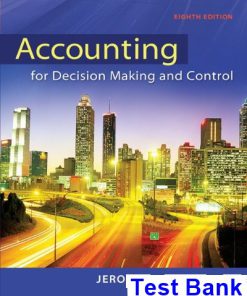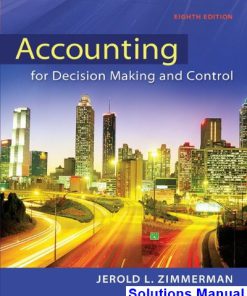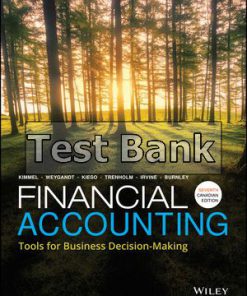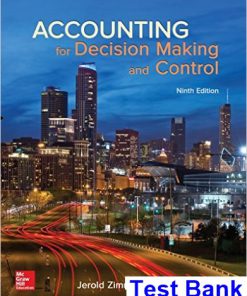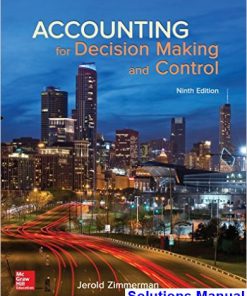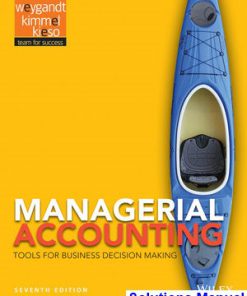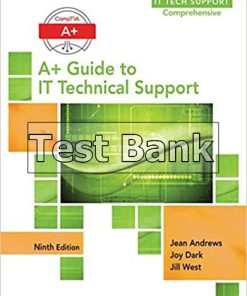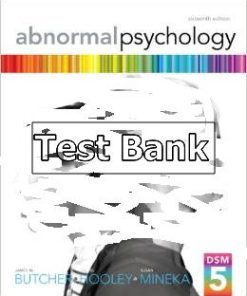Accounting for Decision Making and Control 7th Edition Zimmerman Test Bank
$26.50$50.00 (-47%)
Accounting for Decision Making and Control 7th Edition Zimmerman Test Bank.
You may also like
Accounting for Decision Making and Control 7th Edition Zimmerman Test Bank

Product details:
- ISBN-10 : 0078136725
- ISBN-13 : 978-0078136726
- Author: Zimmerman, Jerold
Accounting for Decision Making and Control provides students and managers with an understanding appreciation of the strengths and limitations of an organisation’s accounting system. This book provides a framework for thinking about accounting systems and a basis for analysing proposed changes to these systems. The Seventh Edition demonstrates that managerial accounting is an integral part of the firm’s organisational architecture, not just an isolated set of computational topics. The purpose of this text is to provide students and managers with an understanding and appreciation of the strengths and limitations of an organisation’s accounting system, thereby allowing them to be more intelligent users of these systems. The main purpose proposed by the author remains in tact for the Seventh Edition.
Table contents:
Introduction
1(1)
Managerial Accounting: Decision Making and Control
2(2)
Design and Use of Cost Systems
4(4)
Marmots and Grizzly Bears
8(2)
Management Accountant’s Role in the Organization
10(3)
Evolution of Management Accounting: A Framework for Change
13(2)
Vortec Medical Probe Example
15(3)
Outline of the Text
18(1)
Summary
19(3)
The Nature of Costs
22(67)
Opportunity Costs
23(5)
Characteristics of Opportunity Costs
24(1)
Examples of Decisions Based on Opportunity Costs
24(4)
Cost Variation
28(6)
Fixed, Marginal, and Average Costs
28(3)
Linear Approximations
31(1)
Other Cost Behavior Patterns
32(1)
Activity Measures
33(1)
Cost-Volume-Profit Analysis
34(11)
Copier Example
34(2)
Calculating Break-Even and Target Profits
36(4)
Limitations of Cost-Volume-Profit Analysis
40(1)
Multiple Products
40(2)
Operating Leverage
42(3)
Opportunity Costs versus Accounting Costs
45(5)
Period versus Product Costs
46(1)
Direct Costs, Overhead Costs, and Opportunity Costs
46(4)
Cost Estimation
50(1)
Account Classification
50(1)
Motion and Time Studies
50(1)
Summary
50(39)
Costs and the Pricing Decision
51(38)
Opportunity Cost of Capital and Capital Budgeting
89(46)
Opportunity Cost of Capital
90(3)
Interest Rate Fundamentals
93(7)
Future Values
93(1)
Present Values
94(1)
Present Value of a Cash Flow Stream
95(1)
Perpetuities
96(1)
Annuities
97(1)
Multiple Cash Flows per Year
98(2)
Capital Budgeting: The Basics
100(4)
Decision to Acquire an MBA
100(1)
Decision to Open a Video Rental Store
101(1)
Essential Points about Capital Budgeting
102(2)
Capital Budgeting: Some Complexities
104(5)
Risk
104(1)
Inflation
105(2)
Taxes and Depreciation Tax Shields
107(2)
Alternative Investment Criteria
109(6)
Payback
109(1)
Accounting Rate of Return
109(2)
Internal Rate of Return (IRR)
111(3)
Methods Used in Practice
114(1)
Summary
115(20)
Organizational Architecture
135(35)
Basic Building Blocks
136(10)
Self-Interested Behavior, Team Production, and Agency Costs
136(6)
Decision Rights and Rights Systems
142(1)
Role of Knowledge and Decision Making
142(1)
Markets versus Firms
143(2)
Influence Costs
145(1)
Organizational Architecture
146(6)
Three-Legged Stool
147(3)
Decision Management versus Decision Control
150(2)
Accounting’s Role in the Organization’s Architecture
152(3)
Example of Accounting’s Role: Executive Compensation Contracts
155(2)
Summary
157(13)
Responsibility Accounting and Transfer Pricing
170(59)
Responsibility Accounting
171(14)
Cost Centers
171(3)
Profit Centers
174(1)
Investment Centers
175(5)
Economic Value Added (EVA®)
180(3)
Controllability Principle
183(2)
Transfer Pricing
185(14)
International Taxation
185(2)
Economics of Transfer Pricing
187(4)
Common Transfer Pricing Methods
191(6)
Reorganization: The Solution If All Else Fails
197(1)
Recap
197(2)
Summary
199(30)
Budgeting
229(73)
Generic Budgeting Systems
231(10)
Country Club
231(5)
Private University
236(2)
Large Corporation
238(3)
Trade-Off between Decision Management and Decision Control
241(8)
Communicating Specialized Knowledge versus Performance Evaluation
242(1)
Budget Ratcheting
242(3)
Participative Budgeting
245(1)
New Approaches to Budgeting
246(3)
Managing the Trade-Off
249(1)
Resolving Organizational Problems
249(9)
Short-Run versus Long-Run Budgets
250(2)
Line-Item Budgets
252(1)
Budget Lapsing
253(1)
Static versus Flexible Budgets
253(4)
Incremental versus Zero-Based Budgets
257(1)
Summary
258(44)
Comprehensive Master Budget Illustration
259(43)
Cost Allocation: Theory
302(45)
Pervasiveness of Cost Allocations
304(4)
Manufacturing Organizations
305(1)
Hospitals
306(1)
Universities
306(2)
Reasons to Allocate Costs
308(4)
External Reporting/Taxes
308(1)
Cost-Based Reimbursement
309(2)
Decision Making and Control
311(1)
Incentive/Organizational Reasons for Cost Allocations
312(10)
Cost Allocations Are a Tax System
312(1)
Taxing an Externality
313(6)
Insulating versus Noninsulating Cost Allocations
319(3)
Summary
322(25)
Cost Allocation: Practices
347(62)
Death Spiral
348(5)
People also search:
Accounting for Decision Making and Control 7th
Accounting for Decision Making and Control 7th edition
Accounting for Decision Making and Control 7th pdf
Accounting for Decision Making and Control 7th pdf free
Accounting for Decision Making and Control 7th download scribd

